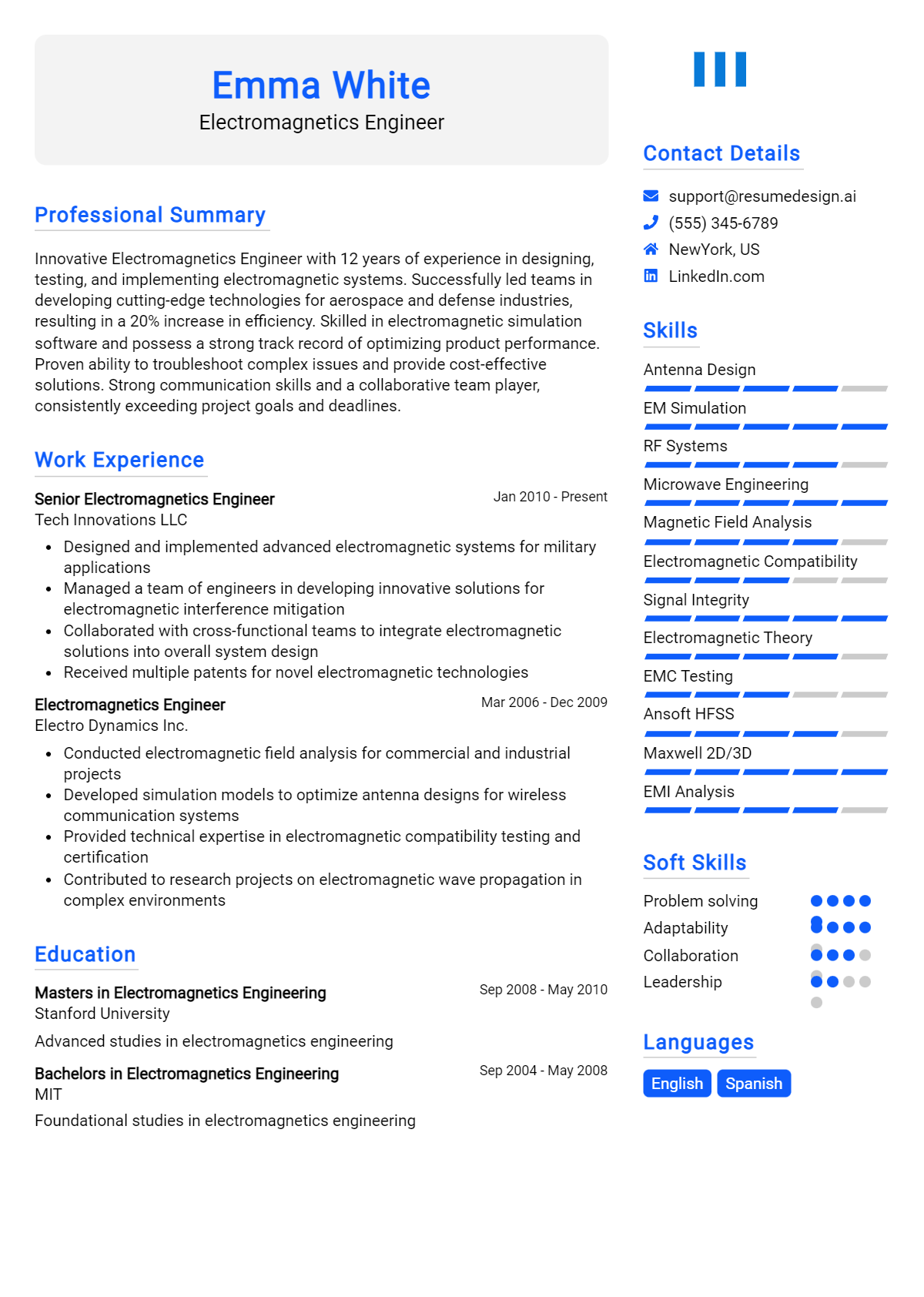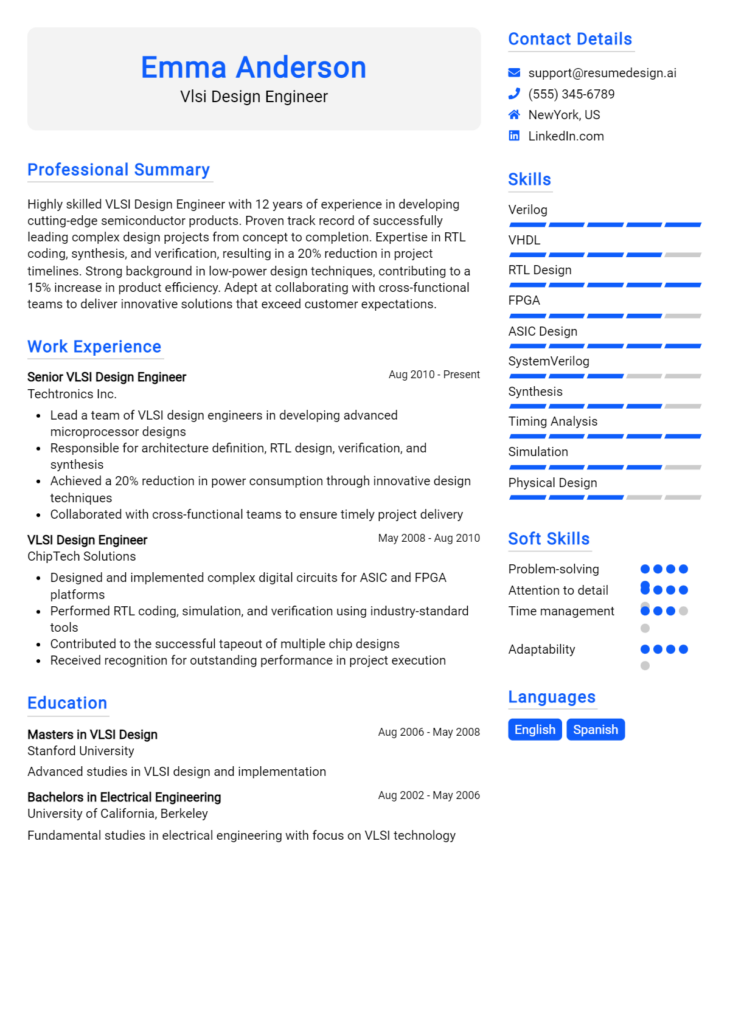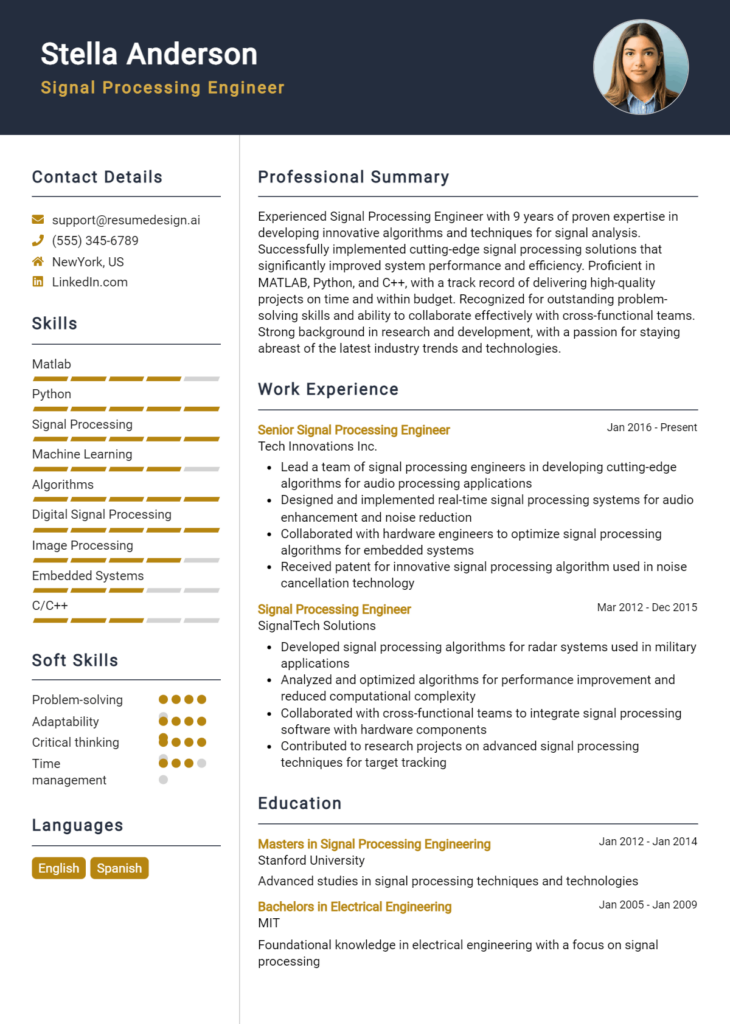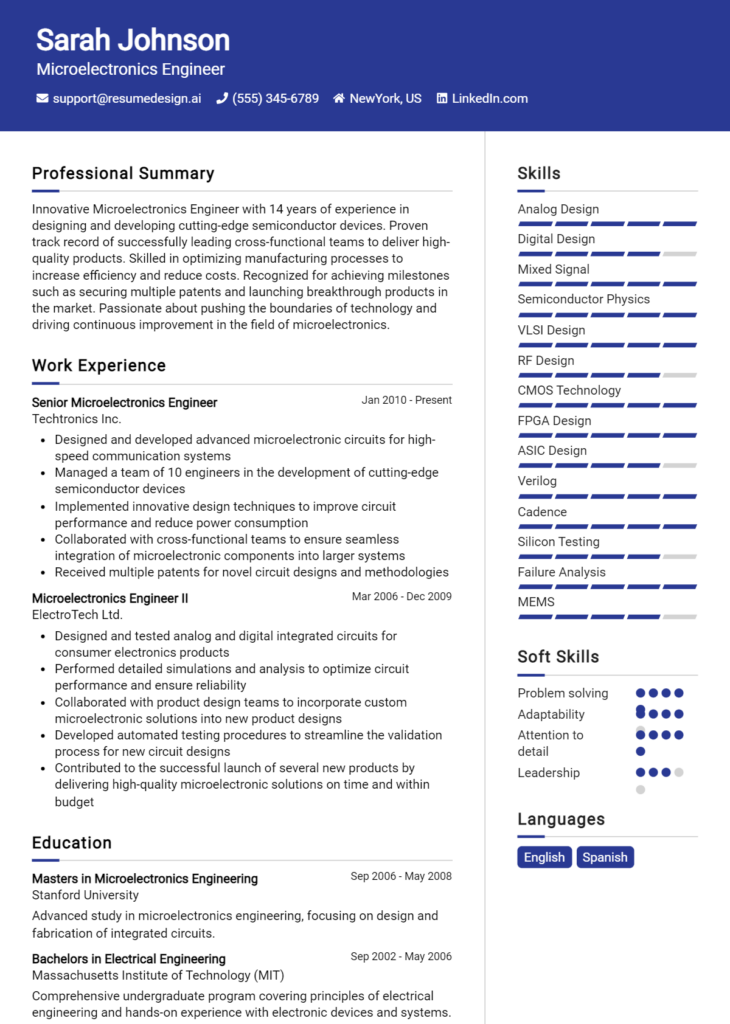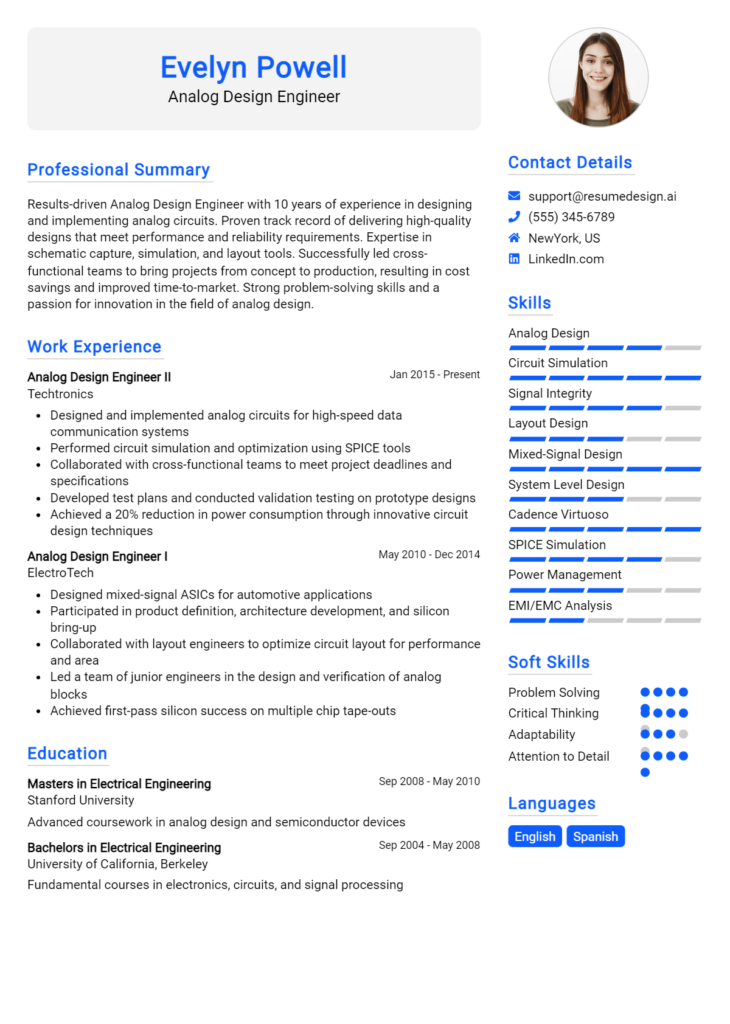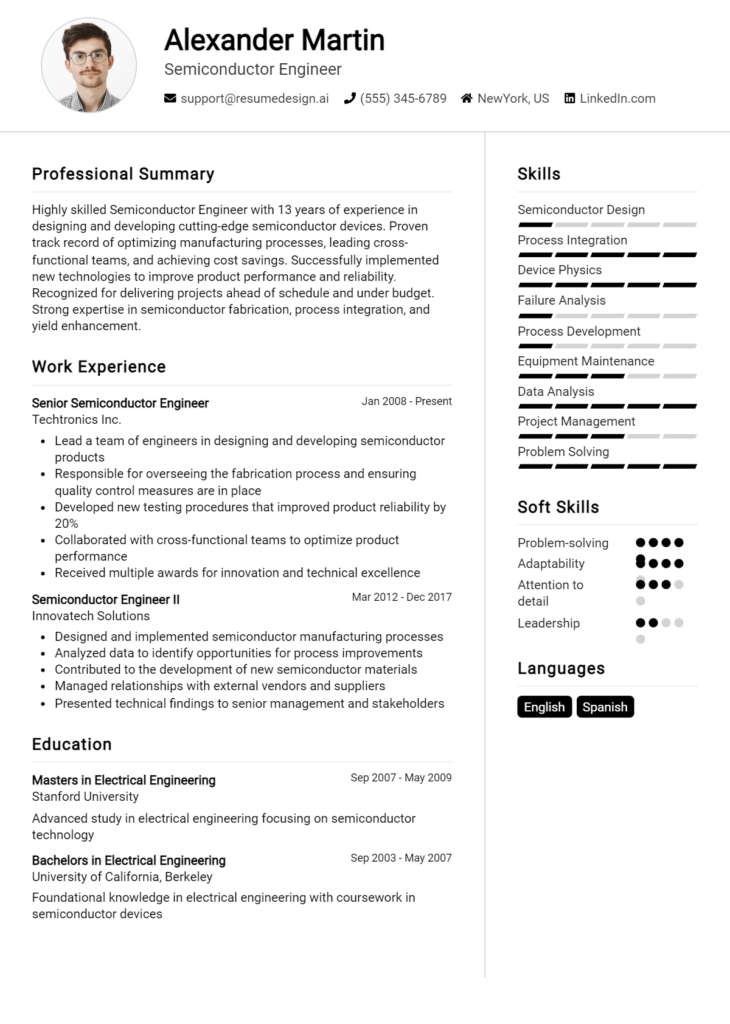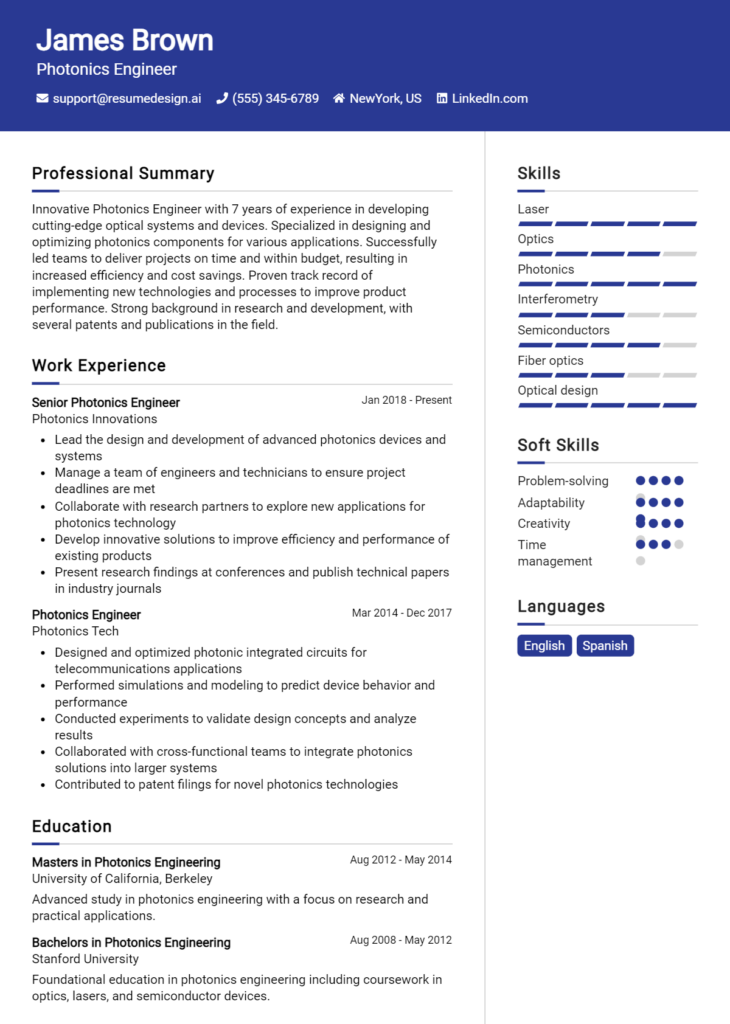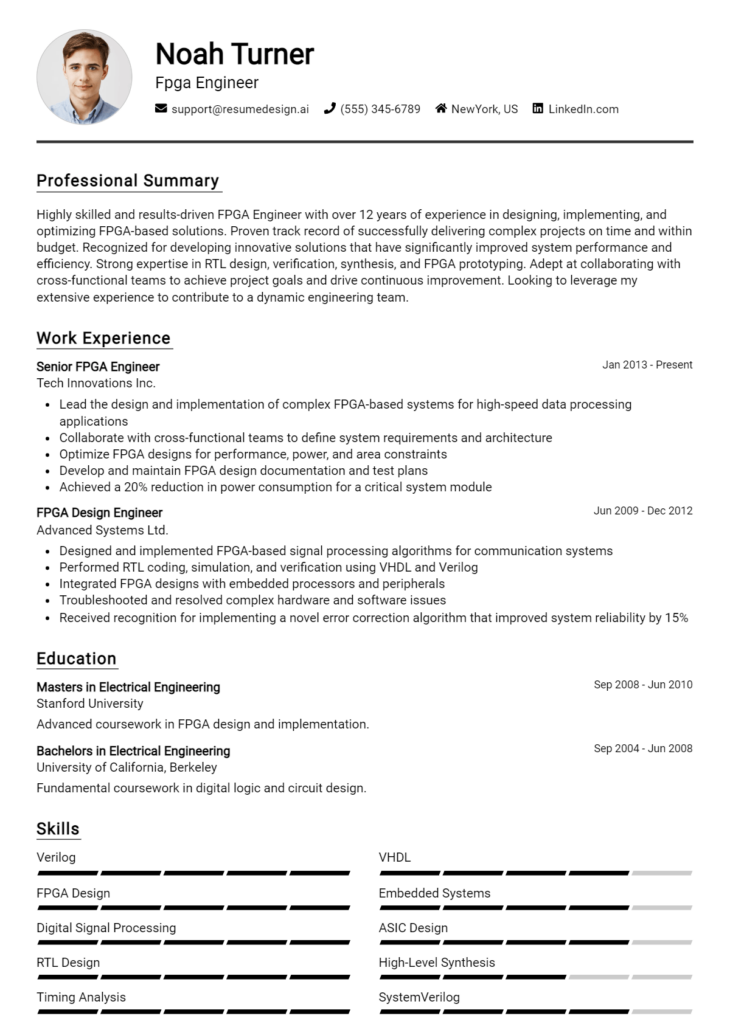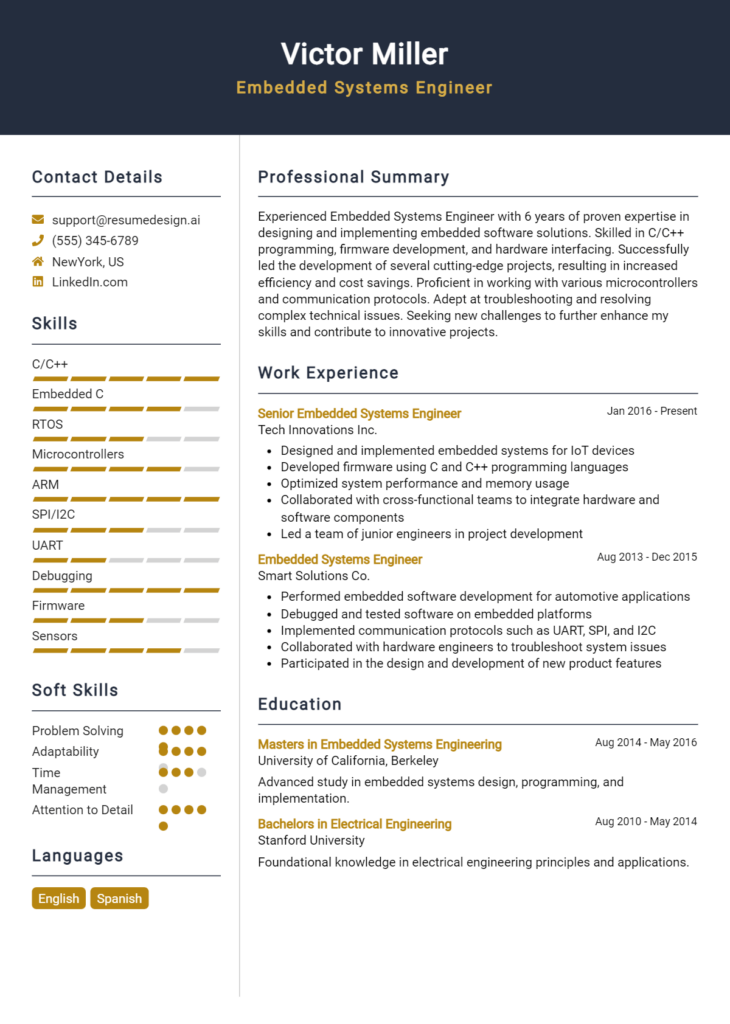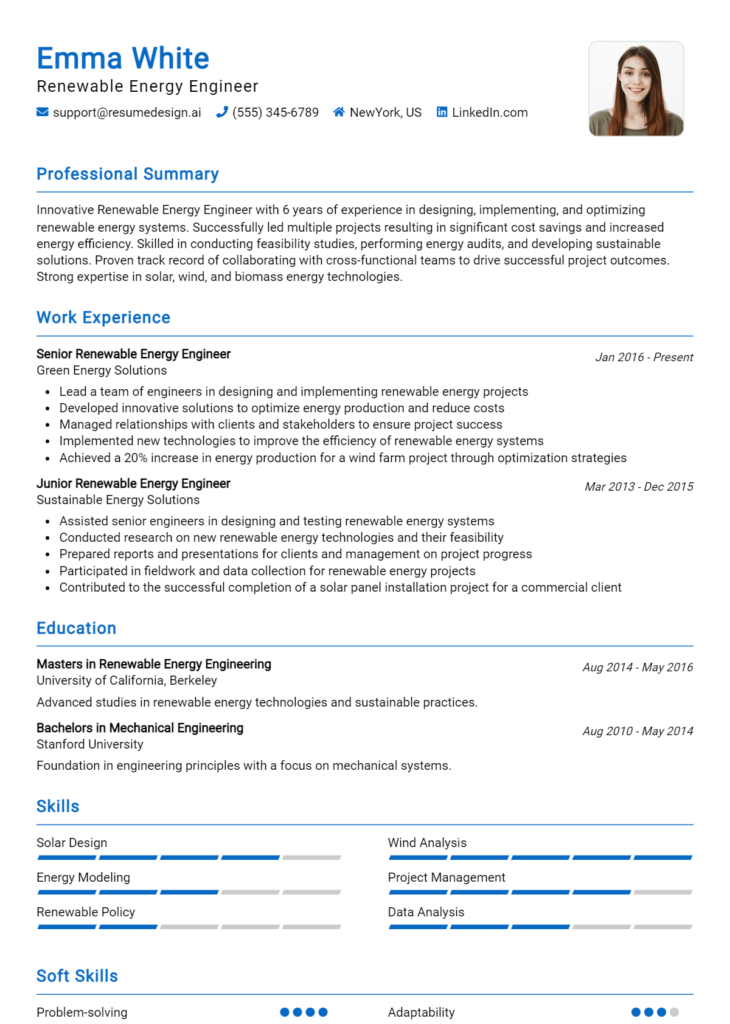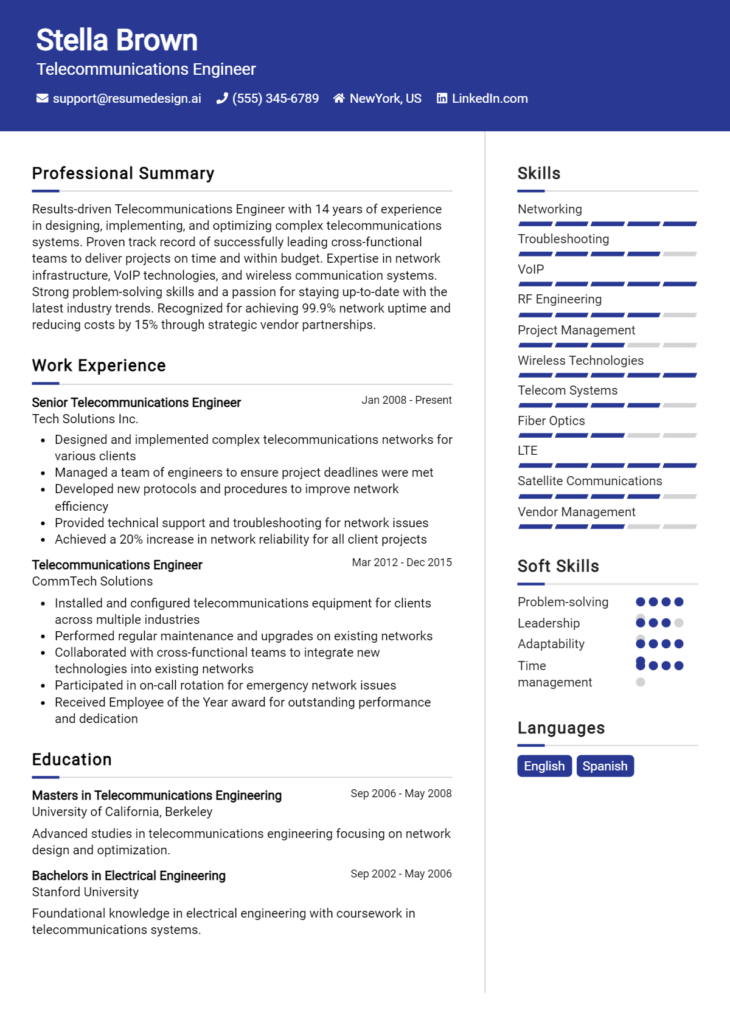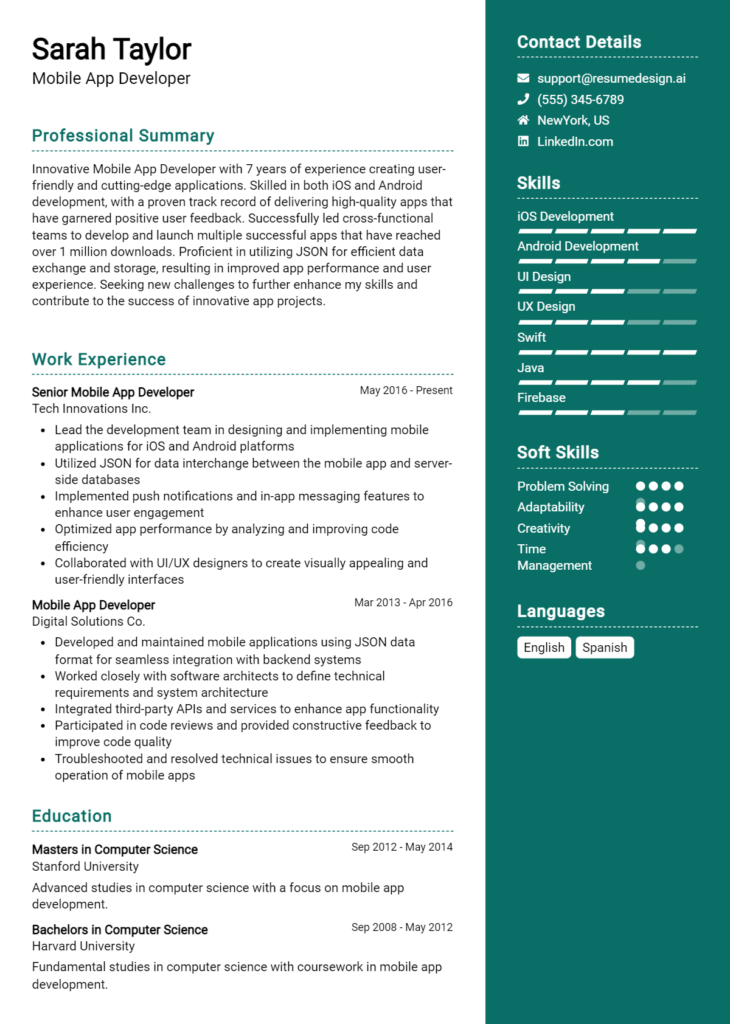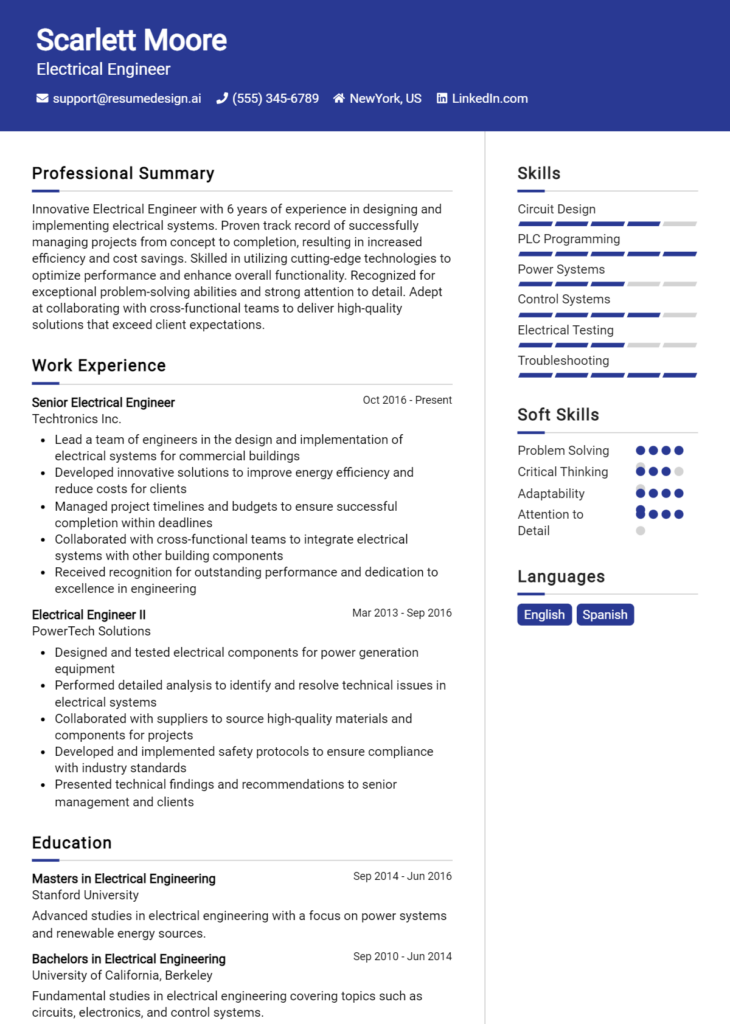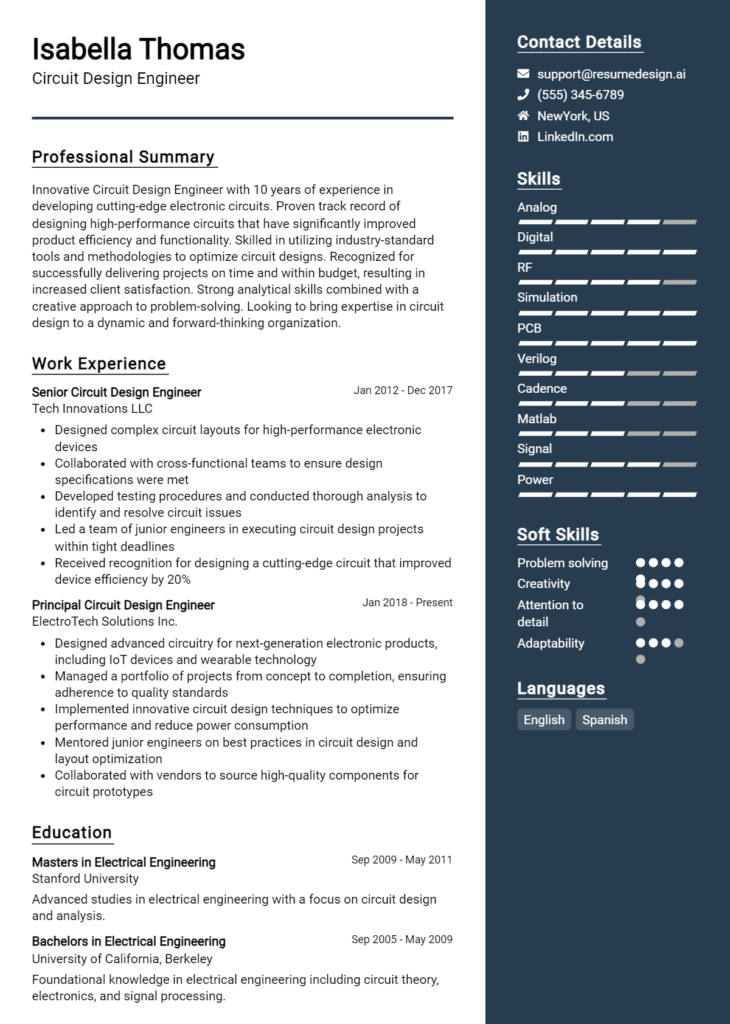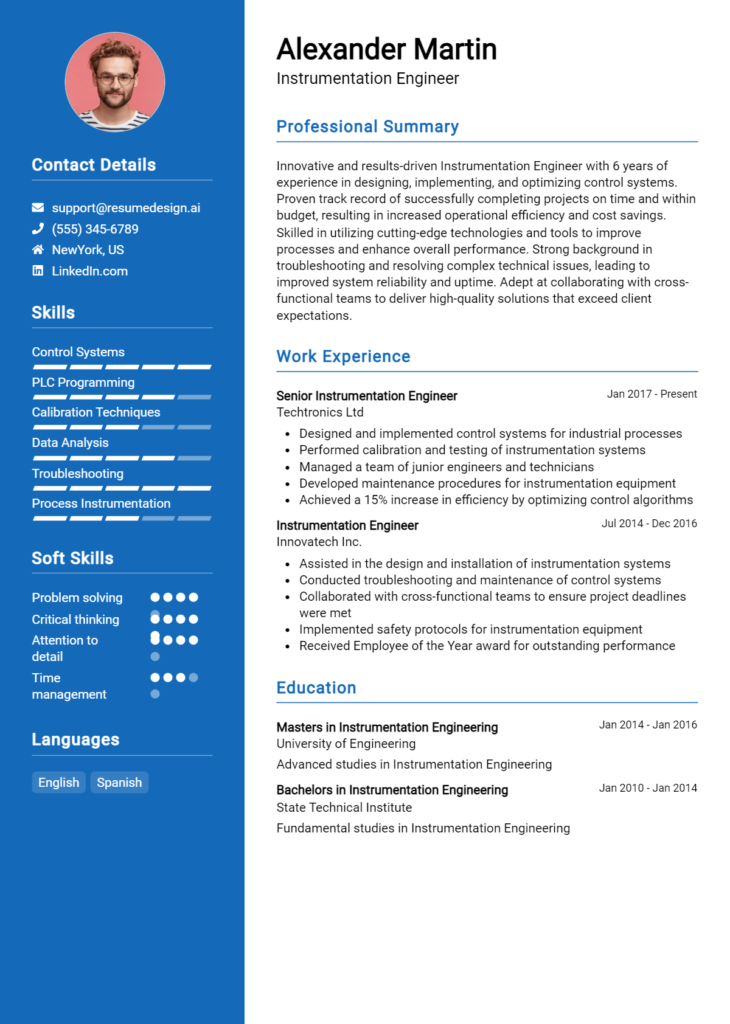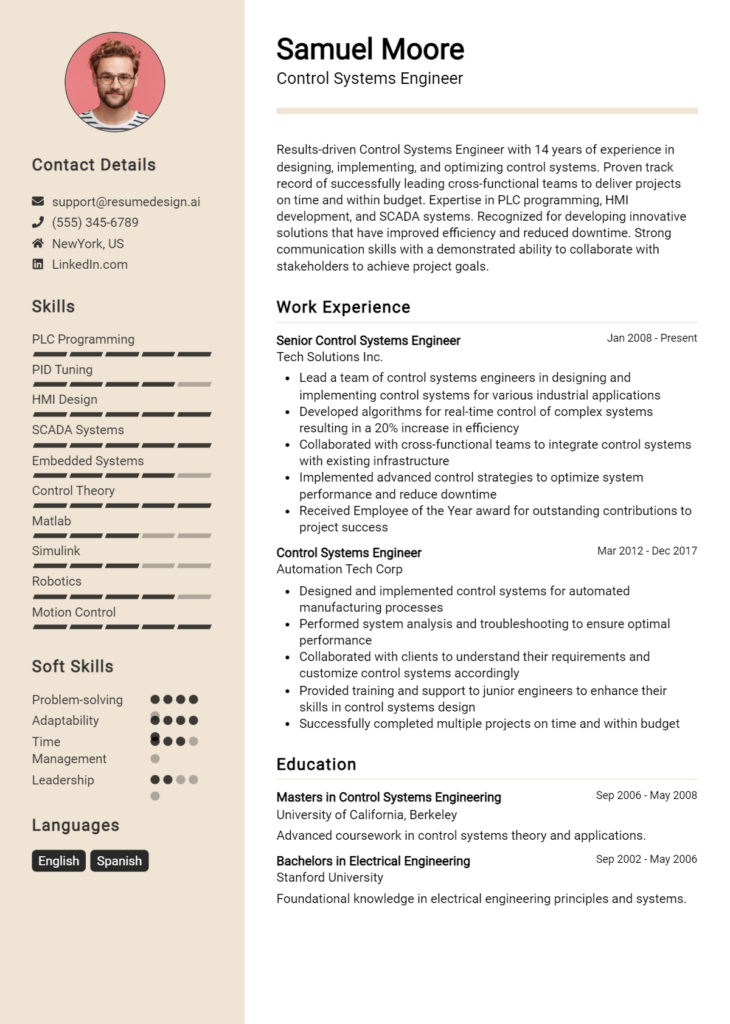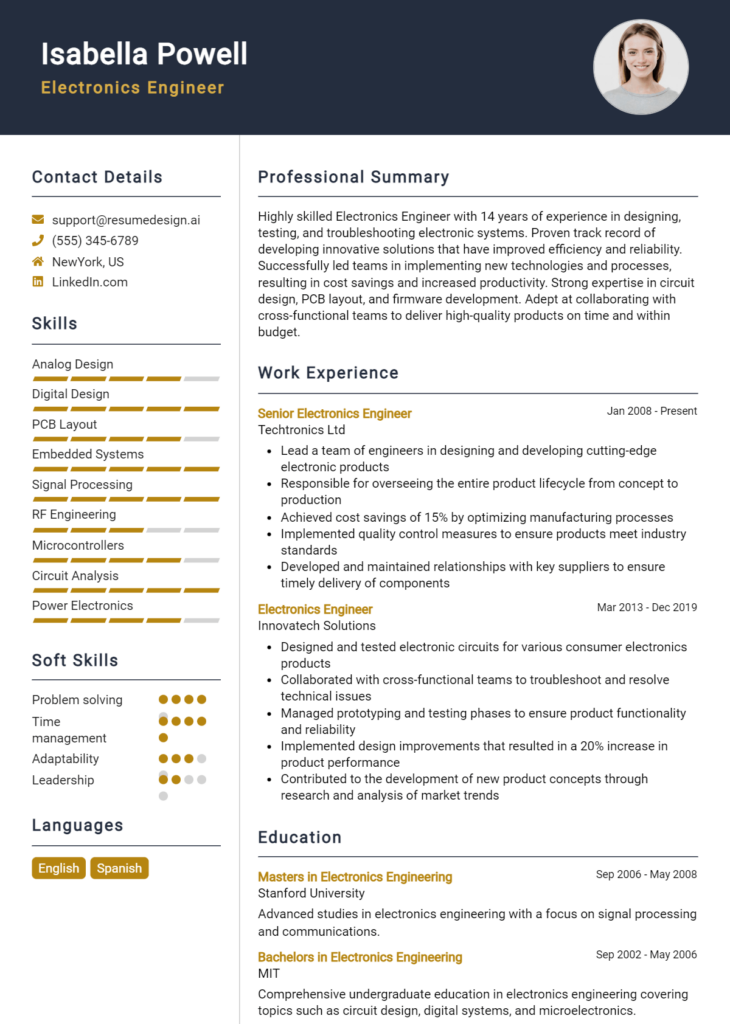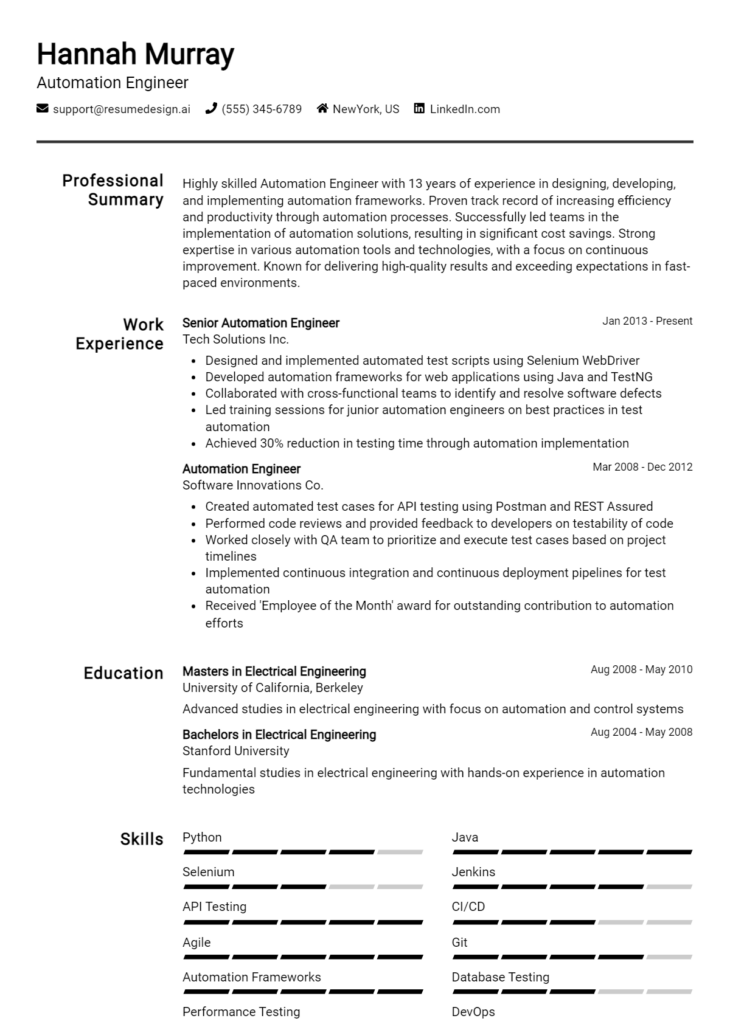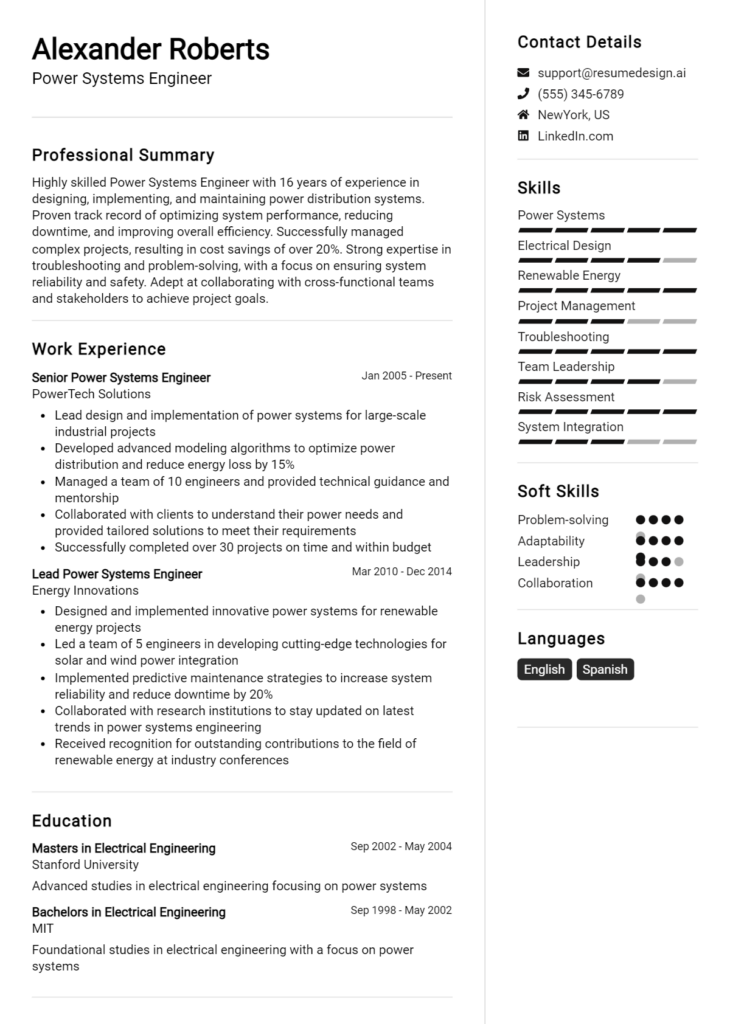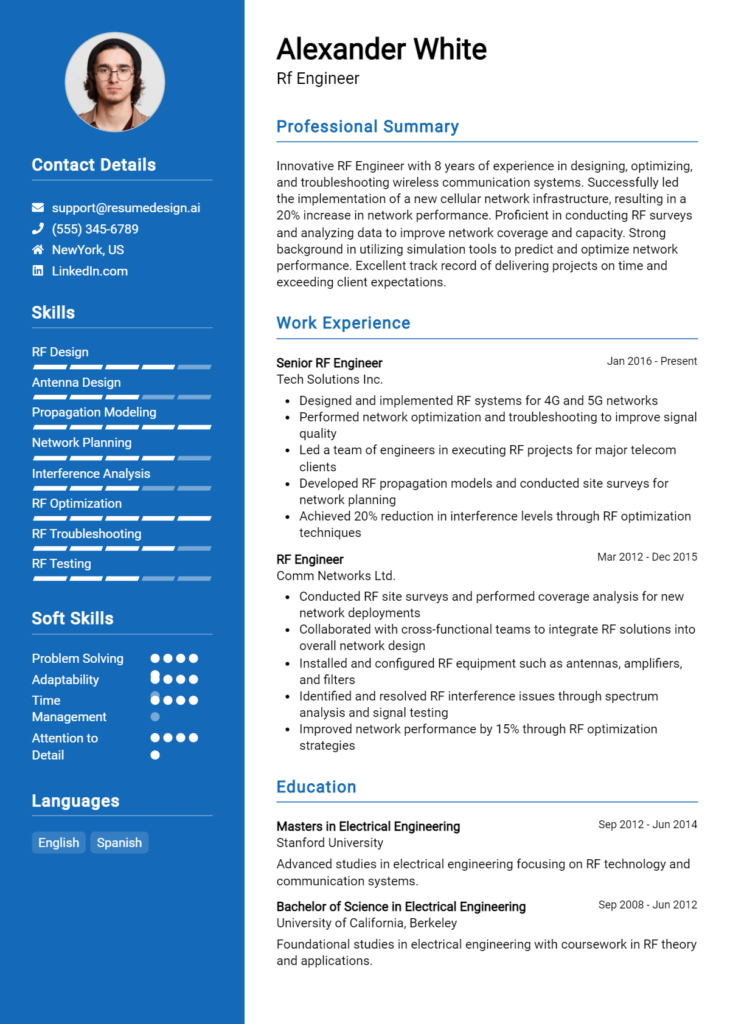Electromagnetics Engineer Core Responsibilities
As an Electromagnetics Engineer, key responsibilities include designing and analyzing electromagnetic systems, conducting simulations, and developing prototypes. This role often bridges various departments, collaborating with software engineers, product developers, and manufacturing teams to ensure seamless integration of electromagnetic technologies. Essential skills encompass technical expertise in electromagnetics, strong operational acumen, and advanced problem-solving abilities. These competencies are crucial for achieving organizational goals, and a well-structured resume can effectively highlight such qualifications to prospective employers.
Common Responsibilities Listed on Electromagnetics Engineer Resume
- Design and analyze electromagnetic components and systems.
- Conduct simulations and modeling of electromagnetic fields.
- Collaborate with cross-functional teams for product development.
- Develop and test prototypes to refine designs.
- Perform electromagnetic interference (EMI) and compatibility testing.
- Document designs, processes, and test results comprehensively.
- Utilize software tools for electromagnetic simulations.
- Provide technical support and troubleshooting for products.
- Ensure compliance with industry standards and regulations.
- Stay updated with advancements in electromagnetic technology.
- Participate in project planning and resource allocation.
- Train and mentor junior engineers in electromagnetic principles.
High-Level Resume Tips for Electromagnetics Engineer Professionals
In the competitive field of electromagnetics engineering, a well-crafted resume is essential for making a strong first impression on potential employers. Your resume serves as a snapshot of your skills, achievements, and professional experience, and it is often the primary tool that hiring managers use to assess your fit for a role. As an electromagnetics engineer, it is crucial that your resume not only highlights your technical expertise but also reflects your accomplishments in a way that aligns with industry standards. This guide will provide practical and actionable resume tips specifically tailored for electromagnetics engineer professionals, helping you stand out in a crowded job market.
Top Resume Tips for Electromagnetics Engineer Professionals
- Tailor your resume for each job application by carefully analyzing the job description and aligning your skills and experiences accordingly.
- Highlight relevant experience in electromagnetics, including specific projects or roles that demonstrate your expertise in the field.
- Quantify your achievements where possible; for example, mention the percentage of efficiency improvements or cost reductions achieved through your designs.
- Showcase industry-specific skills such as RF design, simulation software proficiency, and knowledge of electromagnetic theory.
- Incorporate keywords from the job posting to improve your resume's visibility in applicant tracking systems (ATS).
- Utilize a clear and professional format that enhances readability and emphasizes important information.
- Include certifications or advanced degrees relevant to electromagnetics engineering to demonstrate your commitment to professional development.
- Highlight collaborative projects or teamwork experiences, as these are essential in engineering roles.
- Consider adding a summary statement at the top of your resume that encapsulates your career goals and key qualifications.
- Proofread your resume multiple times to eliminate any grammatical errors or typos that could undermine your professionalism.
Implementing these tips can significantly increase your chances of landing a job in the electromagnetics engineer field. By presenting a focused, tailored resume that showcases your relevant skills and accomplishments, you can effectively capture the attention of hiring managers and set yourself apart from the competition.
Why Resume Headlines & Titles are Important for Electromagnetics Engineer
In the competitive field of electromagnetics engineering, an effective resume headline or title serves as a powerful tool to capture the attention of hiring managers. A strong headline succinctly summarizes a candidate's key qualifications and areas of expertise, providing an immediate snapshot of their professional identity. This crucial first impression can differentiate a candidate from others in the stack, making it essential to craft a headline that is concise, relevant, and directly aligned with the job being applied for. A well-articulated headline not only draws readers in but also sets the stage for the rest of the resume, enhancing the candidate's chances of landing an interview.
Best Practices for Crafting Resume Headlines for Electromagnetics Engineer
- Keep it concise—aim for one impactful phrase.
- Make it role-specific by including relevant keywords.
- Highlight your most significant achievements or skills.
- Avoid jargon—ensure clarity and accessibility.
- Use action words that convey a sense of accomplishment.
- Tailor the headline for each job application to reflect the specific role.
- Incorporate your years of experience if relevant.
- Reflect your educational background or certifications, if applicable.
Example Resume Headlines for Electromagnetics Engineer
Strong Resume Headlines
"Innovative Electromagnetics Engineer with 10+ Years in RF Design and Simulation"
"Results-Driven Electromagnetics Specialist Skilled in Antenna Design and Electromagnetic Compatibility"
“Experienced Electromagnetics Engineer Focused on Advanced Signal Processing Techniques”
“Dynamic Electromagnetics Engineer with a Proven Track Record in High-Frequency Circuit Design”
Weak Resume Headlines
“Engineer Looking for Opportunities”
“Electromagnetics Engineering Professional”
The strong headlines are effective because they immediately communicate the candidate's specific skills, experience, and areas of expertise relevant to the role, making them stand out in a hiring manager's eyes. They are tailored and impactful, ensuring that the most pertinent information is conveyed at a glance. In contrast, the weak headlines fail to impress due to their vagueness and lack of specificity, offering little insight into the candidate's qualifications or unique value, and thus blending into the background of other resumes.
Writing an Exceptional Electromagnetics Engineer Resume Summary
A resume summary is a critical element for an Electromagnetics Engineer, as it serves as the first impression on hiring managers. A well-crafted summary quickly captures attention by succinctly showcasing key skills, relevant experience, and notable accomplishments that align with the job role. It acts as a powerful elevator pitch, allowing candidates to highlight their technical expertise in electromagnetics, problem-solving abilities, and contributions to successful projects. A concise and impactful summary tailored to the specific job application can significantly enhance a candidate's chances of standing out in a competitive job market.
Best Practices for Writing a Electromagnetics Engineer Resume Summary
- Quantify achievements with specific metrics and outcomes to demonstrate impact.
- Focus on the most relevant skills that match the job description.
- Use industry-specific keywords to align with applicant tracking systems.
- Keep the summary concise, ideally within 3-5 sentences.
- Highlight unique accomplishments or projects that set you apart from other candidates.
- Tailor the summary for each job application to reflect the specific requirements of the position.
- Showcase a blend of technical expertise and soft skills, such as teamwork and communication.
- Avoid jargon or overly technical language that may not be understood by all hiring managers.
Example Electromagnetics Engineer Resume Summaries
Strong Resume Summaries
Results-driven Electromagnetics Engineer with over 5 years of experience in designing and optimizing RF systems, achieving a 30% increase in signal efficiency for commercial applications. Proficient in electromagnetic simulation software and possess a solid background in antenna design and testing.
Dynamic Electromagnetics Engineer with a proven track record of leading cross-functional teams to develop innovative solutions that reduced project costs by 15% while enhancing system performance. Expertise in electromagnetic field analysis and strong proficiency in MATLAB and HFSS.
Detail-oriented Electromagnetics Engineer specializing in microwave technology, with 7 years of experience in product development. Successfully implemented a new testing protocol that increased testing throughput by 40%, contributing to faster time-to-market for key products.
Weak Resume Summaries
Electromagnetics Engineer with experience in various projects. I have good technical skills and am looking for a new opportunity.
Engineering professional with a background in electromagnetics. Seeking to apply my skills in a challenging position.
The strong resume summaries are considered effective because they highlight specific achievements, quantify results, and directly relate to the skills and experiences needed for the role. In contrast, the weak summaries lack specific details, do not demonstrate measurable outcomes, and appear too generic, making it difficult for hiring managers to assess the candidate's unique value or relevance to the job. Strong summaries engage the reader and provide compelling reasons to consider the candidate for the position, while weak summaries fail to make an impact.
Work Experience Section for Electromagnetics Engineer Resume
The work experience section of an Electromagnetics Engineer resume plays a critical role in demonstrating the candidate's technical skills and practical knowledge in the field. This section highlights not only the candidate's ability to manage teams and projects but also their proficiency in delivering high-quality electromagnetic solutions. By quantifying achievements and aligning experiences with industry standards, candidates can effectively showcase their impact and value to potential employers, making it vital to present this information clearly and compellingly.
Best Practices for Electromagnetics Engineer Work Experience
- Use specific technical terminology relevant to electromagnetics to demonstrate expertise.
- Quantify achievements wherever possible, such as percentage improvements, cost savings, or project timelines.
- Highlight collaboration by mentioning cross-functional teams and the role played in those teams.
- Focus on results-driven statements that reflect your contributions to significant projects.
- Include certifications or specialized training that enhance your qualifications.
- Tailor your experience to align with the job description and industry standards.
- Use action verbs to convey a sense of initiative and leadership.
- Keep the descriptions concise and relevant, avoiding unnecessary jargon.
Example Work Experiences for Electromagnetics Engineer
Strong Experiences
- Led a team of 5 engineers in the design of a novel antenna system, resulting in a 30% increase in signal strength and a 15% reduction in production costs.
- Developed a simulation model for electromagnetic compatibility testing that reduced testing time by 25%, enhancing product launch timelines.
- Collaborated with cross-disciplinary teams to integrate electromagnetics systems into new product lines, achieving a 20% increase in customer satisfaction ratings.
- Implemented advanced electromagnetic analysis techniques that improved accuracy in predictive modeling by 40%, leading to a significant reduction in design iterations.
Weak Experiences
- Worked on various projects related to electromagnetics.
- Assisted in the development of engineering solutions.
- Participated in team meetings to discuss project status.
- Helped with testing procedures for electronic devices.
The examples above illustrate the difference between strong and weak experiences in an Electromagnetics Engineer resume. Strong experiences provide specific, quantifiable results and demonstrate the candidate's leadership and collaboration skills, while weak experiences are vague and lack measurable outcomes or clear contributions, making them less impactful to potential employers.
Education and Certifications Section for Electromagnetics Engineer Resume
The education and certifications section of an Electromagnetics Engineer resume is crucial as it showcases the candidate's academic background and commitment to professional development in a highly technical field. This section not only highlights relevant degrees and certifications but also signals the candidate's dedication to continuous learning, which is essential in a rapidly evolving industry. By including pertinent coursework, specialized training, and industry-recognized credentials, candidates can significantly enhance their credibility and demonstrate their alignment with the specific requirements of the job role.
Best Practices for Electromagnetics Engineer Education and Certifications
- Include degrees that are directly relevant to electromagnetics, such as Electrical Engineering or Physics.
- List industry-recognized certifications, such as those from IEEE or relevant technical organizations.
- Highlight any specialized training or workshops that enhance your skill set specific to electromagnetics.
- Provide relevant coursework that demonstrates your knowledge of key concepts and technologies in electromagnetics.
- Use clear and concise formatting to improve readability and make important details stand out.
- Include honors or awards received during your education to showcase academic excellence.
- Keep the section updated with the latest certifications or courses completed to show your commitment to ongoing education.
- Tailor the section to the specific job description, emphasizing qualifications most relevant to the position.
Example Education and Certifications for Electromagnetics Engineer
Strong Examples
- M.S. in Electrical Engineering, University of California, Berkeley, 2021
- Certified Electromagnetic Compatibility (EMC) Engineer, International Association for Radio, Telecommunications and Electromagnetics (iNARTE), 2022
- Relevant Coursework: Advanced Electromagnetics, RF Circuit Design, Microwave Engineering
- Professional Development: Electromagnetic Field Theory Workshop, 2023
Weak Examples
- B.A. in English Literature, University of Texas, 2015
- Certification in Graphic Design, Online Course, 2018
- Outdated Course: Basic Electricity, Completed in 2010
- High School Diploma, Graduated 2005
The strong examples are considered relevant and valuable because they demonstrate a clear focus on education and certifications that directly contribute to the role of an Electromagnetics Engineer. They highlight advanced degrees, specialized training, and certifications that are recognized in the industry. Conversely, the weak examples do not align with the technical requirements of the position and include qualifications that are outdated or irrelevant to the field, thereby diminishing the candidate's credibility.
Top Skills & Keywords for Electromagnetics Engineer Resume
The role of an Electromagnetics Engineer is both challenging and rewarding, requiring a unique blend of technical expertise and interpersonal skills. A well-crafted resume that highlights the essential skills can set a candidate apart in this competitive field. Employers look for specific competencies that indicate an engineer's ability to design, analyze, and troubleshoot electromagnetic systems effectively. By showcasing both hard and soft skills, candidates can demonstrate their proficiency and adaptability, making them more appealing to potential employers.
Top Hard & Soft Skills for Electromagnetics Engineer
Soft Skills
- Problem-solving
- Critical thinking
- Team collaboration
- Effective communication
- Attention to detail
- Time management
- Creativity
- Adaptability
- Leadership
- Project management
Hard Skills
- Electromagnetic theory
- Circuit design
- Simulation software (e.g., ANSYS, HFSS)
- MATLAB proficiency
- RF and microwave engineering
- Antenna design
- Signal processing
- Electromagnetic compatibility (EMC)
- Measurement techniques
- Data analysis and interpretation
By emphasizing these skills on your resume, alongside relevant work experience, you can effectively convey your qualifications and readiness for a successful career as an Electromagnetics Engineer.
Stand Out with a Winning Electromagnetics Engineer Cover Letter
I am writing to express my enthusiasm for the Electromagnetics Engineer position at [Company Name], as advertised on [Job Board/Company Website]. With a Master’s degree in Electrical Engineering and over five years of hands-on experience in electromagnetic design and analysis, I am confident in my ability to contribute effectively to your team. My background in developing innovative solutions for various electromagnetic applications aligns perfectly with the cutting-edge projects at [Company Name].
Throughout my career, I have honed my skills in electromagnetic simulation and modeling using tools such as ANSYS HFSS and CST Microwave Studio. At my previous role with [Previous Company Name], I led a project that optimized the design of an antenna array, resulting in a 30% improvement in gain while reducing the overall footprint. My strong foundation in Maxwell’s equations, coupled with practical experience in RF circuit design, allows me to approach complex problems with a comprehensive perspective. I am particularly excited about the prospect of working on [specific project or technology relevant to the company], as I believe my expertise could help drive its success.
I thrive in collaborative environments and am adept at communicating technical concepts to non-technical stakeholders, which I believe is essential in a multidisciplinary team. My project management experience further equips me to handle tight deadlines while maintaining high standards of quality and innovation. I am eager to bring my skills in electromagnetic compatibility testing and signal integrity analysis to [Company Name] and contribute to the development of groundbreaking technologies.
Thank you for considering my application. I look forward to the opportunity to discuss how my background, skills, and enthusiasms align with the goals of your team at [Company Name]. I am excited about the possibility of contributing to your innovative projects and am available for an interview at your earliest convenience.
Common Mistakes to Avoid in a Electromagnetics Engineer Resume
When crafting a resume for an Electromagnetics Engineer position, it's crucial to present your skills and experiences effectively to stand out in a competitive job market. However, many candidates make common mistakes that can undermine their chances of landing an interview. By being aware of these pitfalls, you can ensure that your resume showcases your qualifications in the best light.
Lack of Specificity: Failing to provide detailed descriptions of your projects can lead to a vague impression. Be specific about the technologies and methodologies you used, as well as your direct contributions.
Ignoring Relevant Keywords: Many companies use applicant tracking systems (ATS) to filter resumes. Not including relevant keywords related to electromagnetics can result in your resume being overlooked.
Overloading with Technical Jargon: While it’s essential to demonstrate your technical expertise, using too much jargon can alienate non-technical HR personnel. Strike a balance that showcases your technical skills while remaining accessible.
Insufficient Tailoring: Submitting a generic resume for different positions is a missed opportunity. Tailor your resume to highlight the skills and experiences most relevant to each specific job description.
Neglecting Soft Skills: Electromagnetics engineering isn’t just about technical skills; soft skills like teamwork, communication, and problem-solving are also critical. Ensure these are reflected in your resume.
Formatting Issues: A cluttered or inconsistent format can distract from your content. Use a clean, professional layout with clear headings and bullet points to enhance readability.
Omitting Achievements: Simply listing duties without emphasizing achievements can make your resume less impactful. Quantify your accomplishments, such as improvements in efficiency or successful project completions.
Ignoring Education and Certifications: Given the technical nature of the field, your educational background and any relevant certifications should be prominently featured. Don’t underestimate their importance in establishing your credibility.
Conclusion
As we conclude our exploration of the Electromagnetics Engineer role, it's clear that this position demands a blend of specialized knowledge and practical skills. Key responsibilities include designing and testing electromagnetic systems, analyzing field interactions, and developing solutions to complex engineering challenges. Continuous learning and staying updated on technological advancements are vital for success in this dynamic field.
To ensure you present yourself effectively in this competitive job market, it's essential to have a polished resume that highlights your expertise and achievements. We encourage you to review your Electromagnetics Engineer resume and make any necessary updates that showcase your qualifications.
To aid you in this process, consider utilizing our resources, including a variety of resume templates, an intuitive resume builder, curated resume examples, and professional cover letter templates. These tools can help you create a standout application that captures the attention of potential employers. Start refining your resume today and take the next step in your Electromagnetics Engineering career!

